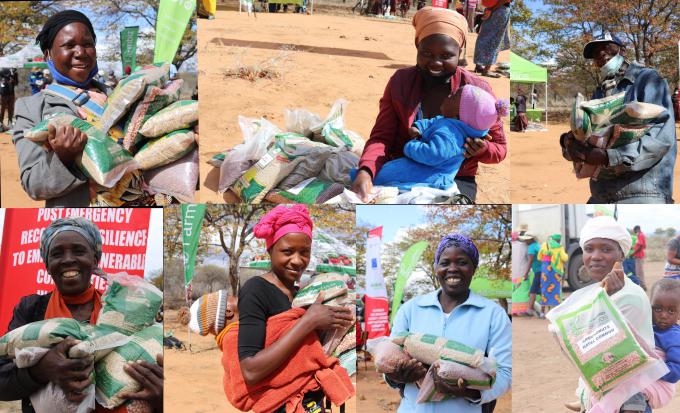Addressing Child Hunger in Zimbabwe

Prolonged drought in Beitbridge and Matobo districts, worsened by climate change, has resulted in limited access to food for many children and their families. Most small holder farmers in these districts suffer from these adverse effects of droughts due to lack of information on ideal seed varieties suitable for their area and finances for purchasing them.
To help farmers in the two district tackle food insecurity, Save the Children hosted Seed Fairs under the EU funded SUPER-EVC project. 1500 farmers were given seed vouchers by SC and they used these to purchase drought resistant seeds packs varying from groundnuts, cowpeas, sorghum and pearl millet at the fairs. Three certified seed suppliers marketed their seed varieties during the fairs and farmers purchased seeds from a supplier of their choice after getting adequate information on the benefits of adopting the different seed varieties. Here is what the happy farmers had to say:
“These crop seeds grow well despite the heat and low rainfall we get in this area. I am hopeful I will grow enough food to feed my children,” Spiwe, Beitbridge.
“I’m happy I now have seeds for the next farming season. I would like to thank Save the Children for bringing the seed packs to us on time and they are suitable for this area’s climatic conditions. My children will not go hungry,” Angela, Beitbridge.
“There is so much nutritious value in these seed crops. I hope to grow enough food to feed my seven grandchildren so they grow up healthy and strong,” Francina, Matobo.
Prior receiving seed vouchers, farmers conducted conservation works in their fields after being trained on conservation agriculture by the Department of Mechanization and Agritex. The consevations works included included dead contours, gulley reclamation, and infiltration pits, which promote minimal soil disturbance and conservation of moisture received from rainfall in the face of climate change. With the suitable seed varieties and knowledge on conservation farming methods, farmers can grow enough healthy and nutritious food despite the harsh weather conditions experienced in their districts. This helps to ensure no child goes hungry.
Thanks to the EU funded livelihoods project for building resilience of vulnerable households in Beitbridge and Matobo through timely provision of drought tolerant seeds.
 Zimbabwe
Zimbabwe